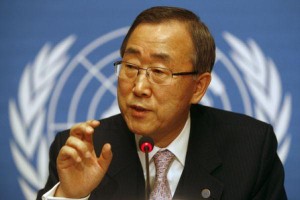On the heels of the International Day of Families on May 15, experts reflect on the significance of the occasion and evaluate the impact of family values on the society. Senior Correspondent, ONYEWUCHI OJINNAKA, writes.

In the beginning, according to the Bible, God created man and gave him woman as a helpmeet. Since then, men have unchallengably been in charge of the family, until modern ladies started demanding gender equality. This issue was brought to the fore at the 2015 edition of International Day of Families.
May 15 is observed across the world as international family day. With ‘Men in charge? Gender equality and children’s rights in contemporary families’, this year’s edition aims at promoting the importance of a healthy and well-balanced family.
World leaders and experts used the occasion to advocate healthy living and harmony within the family.
In the message to all families of the world, United Nations Secretary-General, Ban Ki-moon, said: “As we strive to usher in a more sustainable future, achieve the Millennium Development Goals (MDGs), shape a new development agenda and combat climate change, let us mobilise the world’s families.”
A wide range of events were organised at local and international levels. The events include workshops, seminars and policy meeting for public officials; exhibitions and organised discussions to raise awareness of the annual theme; educational sessions for children and young people; and the launch of campaigns for public policies to strengthen and support family units.
The year 1994 was proclaimed as the International Year of Families by the UN resolution A/RES/47/237 which reflects the importance the international community attaches to families.
In response to changing social and economic structures, which have affected and are still affecting the structure and stability of family units in many regions of the globe, the UN in 1994 declared May 15 every year as International Day of Families. The day is an occasion to reflect on the work started that year and to celebrate the importance of families, people, societies and cultures around the world. It has been held every year since 1995.
In Nigeria, the day was marked with funfair as family care experts advised on good parenting, to promote unity and love in the family and society.
The day offers an opportunity to promote awareness on issues relating to families and to increase knowledge of the social, economic and demographic processes affecting families. It was an auspicious day to highlight the prevention of family violence through fair family law frameworks and a variety of programme interventions.
Speaking on the significance of the event, a psychologist, Dr. Kelechi Ahuchogu, decried the negative effect of poor parenting.
He said: “The family has a huge role to play in the moulding of an individual much as the genes, environment and other factors do. Character formation is largely built through the family.
“Negative parenting has dire consequences on the children; it can lead to a lot of psychological trauma and anti-social behaviours. An unstable family with poor parenting also has negative impact on the academics of children.
“The potential problems of poor parenting also include withdrawal, learning disorders, loneliness, anxiety and depression, alcohol and drug abuse, stealing, social misconducts and even suicide tendencies.”
“Other challenges that can result from poor family or parental upbringing include discipline challenges, unstable behaviour, recklessness as well as violent and bullying behaviours.”
Citing some parental factors that contributed to poor parenting, Ahuchogu maintained that family life and roles have changed a lot, adding that parents used to be firmly in charge, with even the extended family and friends assisting in correcting an errant child; but today, families are failing in their duties.
Parents today tolerate children’s rudeness, succumb to their demands and even make excuses for their misconducts. Consequently, the children grow up misbehaving, lacking respect, dignity, values and conscience.
He, however, pointed out that some parental factors that have contributed to breakdown in family values and poor parenting include family conflict and discord, divorce, over-protection and excessive pampering of children.
“Others are instability in parent’s character or behaviours, alcohol and substance abuse as well as poverty,’’ Ahuchogu posited.
Also speaking, a Family Life Consultant, Praise Fowowe, attributed the increase in rape cases to poor parenting and care.
“The incessant cases of child rape and molestation can be attributed to poor parental monitoring and care; many parents are not paying attention. Many parents have mixed up their priorities.
“Modern parents spend more time at work and in pursuit of daily bread, thereby leaving their children in the care of domestic helps and teachers who take advantage of them.
“There are more cases of older people raping younger children, cases of fathers, brothers and uncles sleeping with daughters, sisters and nieces and it all degenerates to a world devoid of good morals,” he lamented.
According to Fowowe, the breakdown in family values had led many young people indoctrinated into homosexuality and other forms of sexual perversion, as the rate of young people having challenges with their sexuality was high.
He noted that more six-year-olds are sexually active in Nigeria today and many more pre-teens and teens are embracing same sex in school, especially in a society where wealth defines success level.
Arguing that movies and music contribute to the growth of early sexuality awareness in children and pre-teens, and canvassed that parents should regularly monitor the kind of movies and music that their children watch.
A sociologist, Samuel Nwankwo, while commenting on the family day, argued that parental authority was weakening and recognised the urgent need to revive and restore the value of the family.
According to him, parents should be objective and firm at home, while striking a balance between commendation and correction.
He consequently enjoined parents, the extended family, churches, schools, role models and everyone to join hands to ensure that good family values were upheld.
Director, Social Communications, Catholic Archdiocese of Lagos, Monsignor Gabriel Osu, stressed that societal and family values have eroded, thereby glorifying social ills and crime in the country.
“We need to revive our traditions, cultural values and morals, so that our country will be transformed for the better. Without the family, we cannot really talk of the society. The families should promote values and prayer lives. The values of families seem to have waned.
“The penchant for acquisition of wealth and power have distracted families from building a solid foundation for ideal family norms and values.
“Conscious effort should be made by families to promote love, understanding and unity,” the cleric solicited.
World Red Cross Day too
Friday, May 8, was World Red Cross and Red Crescent Day, an annual observance that falls on the birthday of the movement’s founder, Henry Dunant. The holiday celebrates not only Dunant, but also the International Red Cross and Red Crescent Movement’s seven fundamental principles: humanity, impartiality, neutrality, independence, voluntary service, unity and universality. Overall, the movement aims at helping people by alleviating suffering and promoting peace through its societies, international committee and federation.
Nigeria joined its counterparts across the globe to celebrate the 2015 World Red Cross Day on May 8. It was marked in Abuja by members of the movement and other humanitarian organisations.
In Benin-City, Edo State capital, the state branch of the Nigerian Red Cross Society (NRCS) marked the day with ceremony and humanitarian activities.
Speaking at the occasion, the Edo NRCS chairman, Moses Obazee, disclosed that the Society celebrates the World Red Cross Day to remind members and the general public of the selfless service of the founder, Sir Jean Henri Dunant, and those who put their efforts towards the establishment of what is today known as the Red Cross Movement, which is the world’s largest humanitarian organisation.
He outlined the fundamental principles of the Red Cross Movement which is the same globally.
While speaking on the theme: ‘The Fundamental Principles of the Red Cross’, the resource person, Dan-Ehenemwen Enowoghomwenma, who is also the state branch Secretary/Chief Executive Officer (CEO), said the NRCS, which was established in 1961 through an Act of Parliament, takes seriously the fundamental principles of the Movement.
He reiterated that the principle of humanity tells members to love and have compassion with people in distressed condition.
Based on the principle of impartiality, he said, members of the Red Cross do not discriminate, adding that the movement uses triage when carrying out their duties.
According to Eheremwen, the bedrock of the movement is neutrality, as Red Cross Society members are not hypercritical and partisan, adding that despite that NRCS was established through act of parliament, it does not depend on the government for survival.
According to the provision of the Act, members are to serve as auxiliary to the Nigerian government in the area of health, social mobilisation and disaster mitigation.
Former Edo Commissioner for Health and onetime chairman of the State branch of the NRCS, Dr. Wilson Imogan, said the Red Cross was not a non-governmental organisation, but a voluntary organisation with the aim of relieving suffering and disaster.
He said the day marked the 150 years of humanitarian services of the Red Cross Movement, while calling on schools that have detachment of Red Cross groups to increase their membership drive.














